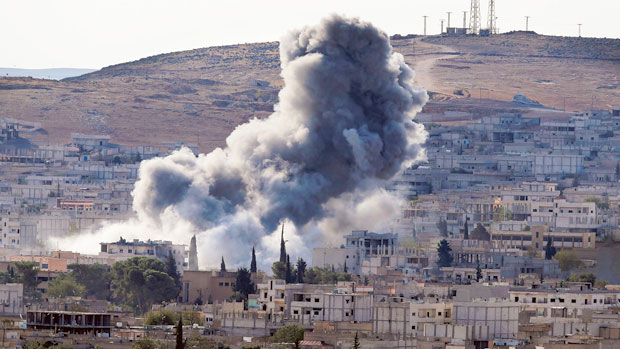
MURSITPINAR, Turkey: Bolstered by intensified US-led coalition airstrikes targeting Daesh militants, Kurdish militiamen fought pitched street battles Wednesday with the extremists in a Syrian Kurdish border town near Turkey, making small advances, activists and officials said.
Elsewhere in Syria, in a stark reminder of the country’s wider civil war, a Syrian lawmaker was gunned down in the central province of Hama - the latest assassination to target a figure linked to President Bashar Al Assad’s government.
In the border town of Kobani, members of the Kurdish People’s Protection Units, or YPG, were advancing hours after the US-led coalition stepped up airstrikes against Daesh militants in and around the town, said Asya Abdullah, a Syrian Kurdish leader.
The Pentagon said Tuesday that 21 airstrikes against Daesh targets near Kobani overnight Monday marked the largest number there in a 24-hour period since the air campaign in Syria began last month.
Abdullah, the co-president of Syria’s powerful Kurdish Democratic Union Party, or PYD, told The Associated Press that Kurdish fighters have advanced near the hill of Tel Shair that overlooks part of the town, taking advantage of the air raids that slowed the push by the militants. Abdullah spoke by phone from Kobani.
In mid-September, Daesh militants launched its offensive on Kobani - also known under its Arabic name of Ain al Arab - and captured dozens of nearby Kurdish villages, as well as about a third of the town. The fighting in and around Kobani has killed more than 500 people and forced more than 200,000 people to flee across the border into Turkey.
The Britain-based Syrian Observatory for Human Rights, which has a network of activists around the country, said Wednesday’s clashes were taking place in the eastern neighborhoods of Kobani as well as the southern edge of the town.
The Observatory also reported several airstrikes by the US-led coalition in the town Wednesday and plumes of smoke rising from the strikes were visible across the border in Turkey.
In Syria’s restive central province of Hama, gunmen opened fire late Tuesday at lawmaker Waris Al Younes’ car as he was travelling on a road linking the city of Hama with the town of Salamiyeh, according to the state-run SANA news agency.
A Syrian official, speaking on condition of anonymity in line with regulations, told The Associated Press that Al Younes died Tuesday night.
No one immediately claimed responsibility for the attack.
Several Syrian officials have been assassinated since Syria’s crisis began in March 2011. The uprising, which later turned into a civil war, has killed more than 190,000 people, according to the United Nations.
Syrian opposition forces have targeted government officials, army and police officers and civil servants in their campaign to topple Al Assad.
Also Wednesday, Syria’s Foreign Ministry dismissed Turkey’s calls for a no-fly zone on the Syrian territories as a “flagrant violation” of the UN charter and international law.
“Syria categorically rejects the establishment of no-fly zones on any part of the Syrian territories under any pretext,” the ministry said.
Turkey has said it won’t join the fight against the Daesh extremists in Syria unless the US-led coalition also goes after the Al Assad’s government, including establishing a no-fly zone and a buffer zone along the Turkish border.
Meanwhile, Syria’s main Western-backed opposition group - the Syrian National Coalition - wrapped up five days of meetings in Turkey late Tuesday. During the sessions, they re-elected opposition’s interim Prime Minister Ahmad Touma to the post he has held since last year.
The Coalition has tried to organize governance in opposition-held territories in northern Syria but its interim government formed last year has been ineffective and beset by divisions. The opposition-held areas have descended into chaos and infighting, mostly between rebel factions and members of Daesh militants that now controls large parts of Syria and Iraq.











